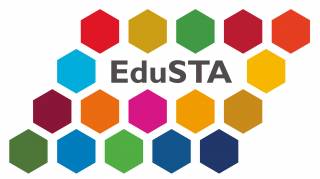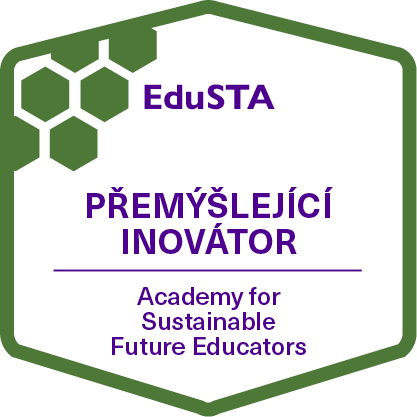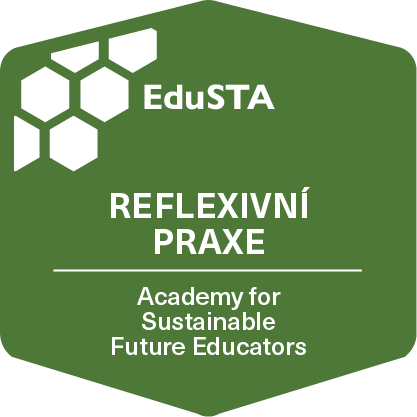The target group of piloting were 62 future VET teachers (= students of two study programmes) and two foreign exchange students at the Institute of Education and Communication.
Table: Badge 3 of Enabling Action and Reflexive Praxis
| Module | SCHOOL PEDAGOGY |
| Learning Mode | HYBRID / Czech language – IEC students
ONLINE / English language – Erasmus students |
| Context | Development of professional teacher competences and social competences such as self-direction |
| Needs | Translations into Czech language
Revision of Czech literature sources Implementing on CZU Moodle with a link to Open-Badge Factory Involvement of 1 evaluator |
| Assessment Criteria | Project reflection based on ESD practice and policy, use of Future’s triangle – video or written proof of maximum 2000 characters of reflection, a reflective logbook with description of own work experience with regard to ESD |
A hybrid form of face-to-face training and asynchronous online learning on LMS Moodle were the appropriated forms for preparation of the badge defence.
The most used methods for contact classes were:
- verbal methods such as discussion or heuristic interview
- collaboration teaching methods
- project education
The intention for choosing the “Conscious Change Agent” badge was to develop students’ reflexive and critical thinking skills or abilities, important skills to master during both their study and in their future professional career. A total of 62 first year’s student teachers were enrolled in the course. 58 out of them managed to earn their first “Reflexive Praxis” badge.
Students at the School Pedagogy course were provided with detailed feedback, highlighting strengths and areas for improvement, if needed. Those, whose submissions required revision were given specific guidance, ensuring a learning-focused process. This approach allowed students to refine their ideas and deepen their understanding of sustainability values.
Students appreciated that the content of course were aligned with their experiences, linked to the environment and especially to their future practice as teachers. They also considered the badges application to be supportive for teachers’ professional identity. They appreciated, that course:
- stimulated reflection and feedback
- focused on subject content and subject didactics
- used activating didactics
- supported collaboration
- used coaching and mentoring
The pilot demonstrated the potential of digital badges to provide formal recognition of ESD competences, enhance professional credentials and confidence among student teachers, and foster innovation in teaching methodologies.
Challenges and lessons learned from the pilots included:
- Time constraints: Some students struggled to balance coursework with other obligations. A more flexible timeline could improve completion rates.
- Administrative adjustments: Extraordinary institutional scheduling changes required adaptations, which were successfully managed by adjusting course timelines.
- Feedback and support: Providing detailed, actionable feedback was critical to helping students succeed and meet badge criteria.
The badges applicant recommended for the future process to expand badge offerings by introducing additional micro-badges to supply to diverse interests and competences. They also asked for improvement of scheduling by offering more flexible timelines to accommodate varying student commitments.
After evaluating of both pilots, the members of IEC EduSTA team concluded that:
- The tested competence could be important (and further developed) during the following part of study courses as well as for the future professional lives of the participants.
- To invent innovations and apply them was easier for those who already work at schools and have some responsibility or motivation to improve own practice (e.g. have both attitudes and experience).
- After some worries at the beginning, the students were able to operate the OBF system, also evaluation was easy.
At the end of the course, participants can perceive the current educational topics and issues and formulate their own opinions: “The students were required to complete ‘the future triangle’, they were asked to complete to collect some comments from colleagues. In general, I was missing a little bit more reflection or evaluation of the badge. I don’t know how to do it now, but in previous years some assignments I like using is the kind of small group reflection where students can meet face to face, introduce their work, and provide comments. Now it was individual work…”
Author: Barbora Jordánová
Main photo: CZU Prague
Digital open badge photos: EduSTA consortium




